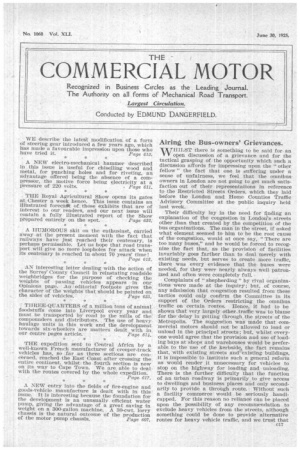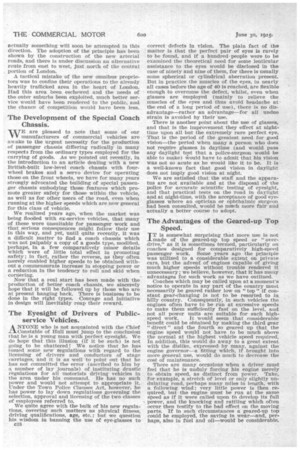Airing the Bus-owners' Grievances.
Page 1

Page 2

If you've noticed an error in this article please click here to report it so we can fix it.
WHILST there is something to be said for an open discussion of a grievance and for the tactical grasping of the opportunity which such a discussion affords for impressing upon the "other fellow" the fact that one is suffering under a sense of unfairness, we feel that the omnibus owners in London are not going to get much satisfaction out of their representations in reference to the Restricted Streets Orders, which they laid before the London and Home Counties Traffic Advisory Committee at the public inquiry held last week.
Their difficulty lay in the need for finding an explanation of the congestion in London's streets other than that created by the competition of the bus organizations. The man in the street, if asked what element seemed to him to be the root cause of the congestion, would at once say, "There are too many buses," and he would be forced to recognize the fact that, as the provision of facilities invariably goes farther than to deal merely with existing needs, but serves to create more traffic, there was every evidence that the buses were needed, for they were nearly always well patronized and often were completely full.
Complaints of " shepherding " by rival organizations were made at the inquiry; but, of course, any admission that congestion resulted from these tactics could only confirm the Committee in its support of the Orders restricting the omnibus traffic on certain routes. Hence, it had to be shown that very largely other traffic was to blame for the delay in getting through the streets of the Metropolis. The suggestion was made that commercial motors should not be allowed to load or unload in the principal streets ; but, whilst everyone would agree that the provision and use of loading bays at shops and warehouses would be preferable to the use of the kerbside, the fact remains that, with existing streets and existing buildings, it is impossible to institute such a general reform as would render it unnecessary for vehicles to stop on the highway for loading and unloading. There is the further difficulty that the function of an urban roadway is primarily to give access to dwellings and business places and only secondarily to provide a through route. Without such a facility commerce would be seriously handicapped, For this reason no reliance can be placed upon the possibility of any recommendation to exclude heavy vehicles from the streets, although something could be done to provide alternative routes for heavy vehicle traffic, and we trust that actually something will soon be attempted in this direction. The adoption of the principle has been shown by the construction of the new arterial roads, and there is under discussion an alternative route from east to west, just north of the central portion of London.
A tactical mistake of the new omnibus proprietors was to confine their operations to the already heavily trafficked area in the heart of London. Had this area been eschewed and the needs of the outer suburbs been exploited, much better service would have been rendered to the public, and the chance of competition would have been less.
The Development of the Special Coach Chassis.
WE are pleased to note that some of our manufacturers of commercial vehicles are awake to the urgent necessity for the production of passenger chassis differing radically in many respects from the ordinary types employed for the carrying of goods. As we pointed out recently, in the introduction to an article dealing with a new British-built low-level coach chassis with fourwheel brakes and a servo device for operating those on the front wheels, we have for many years strongly advocated the building of special passenger chassis embodying those features which promote greater safety for those within the vehicle, as well as for other users of the road, even when running at the higher speeds which are now general for this class of vehicle.
We realized years ago, when the market was being flooded with ex-service vehicles, that many of these were unsuitable for passenger work and that serious consequences might follow their use in this way, and yet, until quite recently, it was a difficult matter to find a coach chassis which was not palpably a copy of a goods type, modified, perhaps, in a few comparatively minor details which were of little total effect in promoting safety; in fact, rather the reverse, as they often merely enabled higher speeds to be obtained without a commensurate increase in stopping power or a reduction in the tendency to roll and skid when cornering.
Now that a real. start has been made with the production of better coach chassis, we sincerely hope that it will be followed up by those Who are at present hanging back. There is business to be done in the right types. Courage and initiative In design will inevitably reap their reward.
The Eyesight of Drivers of Publicservice Vehicles.
A NYONE who is not acquainted with the Chief _Cl_Constable of Hull must jump to the conclusion that he is a young man with perfeCt eyesight. We do hope that this illusion (if it be such) is not going to be shattered ! We notice that he has issued some new regulations with regard to the licensing of drivers and conductors of stage carriages, and it is as well to point out that he has not committed the error (ascribed to him by a number of lay journals) of instituting drastic regulations for all motorists driving vehicles in the area under his command. He has no such power and would not attempt to appropriate it. Under the Town Police Clauses Act, however, he has power to lay down regulations governing the selection, approval and licensing of the two dames of employees referred to.
We quite agree with the bulk of his new regulations, covering' such matters as physical fitness, driving qualifications, age, etc.; but we question his wisdom in banning the use of eye-glasses to correct defects In vision. The plain fact of the matter is that the perfect pair of eyes is rarely to be found, and if a hundred people were to be examined the theoretical need for some lenticular assistance to the eyes would be disclosed in the case of ninety and nine of them, for there is usually some spherical or cylindrical aberration present. But in practice the muscles of the eyes, in nearly all cases before the age of 40 is reached, are flexible enough to overcome the defect, whilst, even when glasses are employed (mainly to relieve the muscles of the eyes and thus avoid headache at the end of a long period of use), there is no disadvantage—rather an advantage—for all undue strain is avoided by their use.
There is another point about the use of glasses, and that is the improvement they effect at nighttime upon all but the extremely rare perfect eye. That is the period of the greatest need for good vision—the period when many a person who does not require glasses in daytime (and would pass any daylight test that a police-surgeon would be able to make) Would have to admit that his vision was not so acute as he would like it to be. It is a well-known fact that good vision in daylight does not imply good 'Vision at night.
We are satisfied that the staff and the apparatus are not available and at the disposal of the police for accurate scientific testing of eyesight, and that practical tests on the road in daylight and at night-time, with the acceptance of good eyeglasses where an optician or ophthalmic surgeon had been consulted, would be mach more fair and actually a better course to adopt.
The Advantages of the Geared-up Top Speed.
IT is somewhat surprising that more use is not made of the geared-up top speed or "overdrive,' as it is sometimes termed, particularly on coaches designed for comparatively high-speed passenger work. Some years ago the principle was utilized to a considerable extent on private cars, but the adventof engines capable of giving much higher speeds without trouble rendered it unnecessary ; we believe, however, that it has many advantages for such work as we have outlined.
Coaches which may be called upon at a moment's notice to operate in any part of the country must necessarily be geared rather low on " top " if constant gear-changing is not to be resorted to in hilly country. Consequently, in such vehicles the engines often have to be run at excessive speeds to make them sufficiently fast on the level, and not all power units are suitable for such high speed work. It would seem that considerable benefit could be obtained by making the third gear " direct " and the fourth so geared up that the engine speed would not have to be much above the normal at the highest vehicle speed required, In addition, this would do away to a great extent with the dislike, expressed by many, against the engine governor—a fitting which, if brought into more general use, would do much to decrease the cost of maintenance.
There are many occasions when a driver must feel that he is unduly forcing his engine merely to obtain speed, as distinct from power. Take, for example, a stretch of level or only slightly undulating road, perhaps many miles in length, with a following wind; very little power is then required, but the engine must be run at the same speed as if It were called upon to develop its full power, and the knocking and rattling which often occur then testify to the bad effect on the moving parts. If in such circumstances a geared-up top could be employed, the saving in wear—and, perhaps, also in fuel and oil—would be considerable.






























